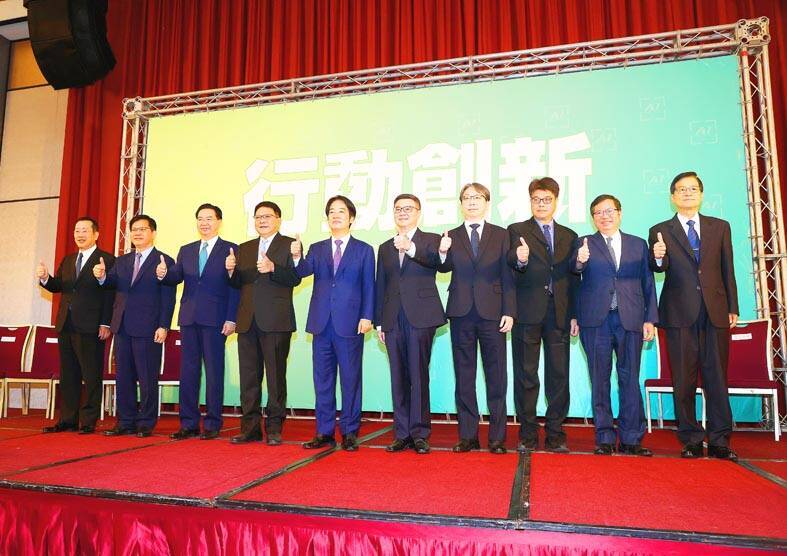《TAIPEI TIMES》William Lai names new Cabinet members

From left, minister of national defense-designate Wellington Koo, minister of foreign affairs-designate Lin Chia-lung, National Security Council secretary-general-designate Joseph Wu, Presidential Office secretary-general-designate Pan Men-an, president-elect William Lai, premier-designate Cho Jung-tai, National Security Bureau Director-General Tsai Ming-yen, Mainland Affairs Council minister-designate Chiu Chui-cheng, Straits Exchange Foundation chairman-designate Cheng Wen-tsan and Veterans Affairs Council minister-designate Yen Teh-fa attend a news conference in Taipei yesterday. Photo: CNA
CALL FOR DIALOGUE: The president-elect urged Beijing to engage with Taiwan’s ‘democratically elected and legitimate government’ to promote peace
/ Staff writer, with CNA
President-elect William Lai (賴清德) yesterday named the new heads of security and cross-strait affairs to take office after his inauguration on May 20, including National Security Council (NSC) Secretary-General Wellington Koo (顧立雄) to be the new defense minister and former Taichung mayor Lin Chia-lung (林佳龍) as minister of foreign affairs.
While Koo is to head the Ministry of National Defense and presidential aide Lin is to take over as minister of foreign affairs, Tsai Ming-yen (蔡明彥) would be retained as the nation’s intelligence chief, continuing to serve as director-general of the National Security Bureau, Lai told a news conference in Taipei.
Koo, 65, is to succeed Chiu Kuo-cheng (邱國正), becoming the seventh civilian to serve as defense minister — a position that has been held more often by retired senior military officers.
Lai also named Minister of Foreign Affairs Joseph Wu (吳釗燮) as new secretary-general of the NSC.
All the members of the new security team have wide-ranging expertise and have been working together in the administration of President Tsai Ing-wen (蔡英文), Lai said.
Taiwan would be best served by government officials with experience across various fields, given the geopolitical situation, the expansion of authoritarianism and the restructuring of the global supply chain, Lai said.
The expected announcement of Koo’s and Lin’s new positions in recent weeks drew a slew of criticism from opposition politicians, who said that they lacked the experience to serve well in those two fields.
Lai yesterday pushed back against those arguments, saying that Koo has rich experience in national security and national defense, having served at the NSC for four years.
Lin is a former transportation minister, lawmaker and mayor, which means he has experience in domestic affairs, Lai said, adding that there is a strong correlation between domestic and foreign affairs.
The president-elect also announced six other people to hold key government positions, including Chiu Chui-cheng (邱垂正) as head of the Mainland Affairs Council (MAC).
Chiu is vice chairman of the Straits Exchange Foundation (SEF) and formerly served as deputy head of the MAC.
Lai touted Chiu Chui-cheng as a “rational” and “pragmatic” figure who is capable of advancing cross-strait relations.
“I believe Chiu Chui-cheng will definitely be able to steadily promote work related to cross-strait relations,” Lai said.
Vice Premier Cheng Wen-tsan (鄭文燦) has been picked to head the SEF, succeeding incumbent Chairman David Lee (李大維), Lai said.
The 56-year-old has been heavily involved in coordinating efforts across different ministries since assuming the role of vice premier in January last year, Lai said.
In the face of “the current unique situation across the Taiwan Strait,” it is hoped that Cheng would apply his ability to coordinate and extensive experience working in the central and local governments to promote a “positive development” in cross-strait relations, he said.
Additionally, Yen De-fa (嚴德發), a former defense minister and former NSC secretary-general, is to head the Veterans Affairs Council, while Pan Men-an (潘孟安), a former Pingtung County commissioner and former Democratic Progressive Party (DPP) lawmaker, is to serve as secretary-general to the president, Lai said.
During the event, Lai called on the Chinese authorities to engage with Taiwan’s “democratically elected and legitimate government” to promote peace across the Strait.
“China needs to be confident and willing to deal with the democratically elected and legitimate government entrusted by the people of Taiwan,” Lai said.
“Only then can exchanges across the Taiwan Strait proceed on the right path,” he said, adding that he has always been open to dialogue with the Chinese authorities and promoting mutual understanding.
He warned against Beijing “solely [having] exchanges with the opposition under a certain prerequisite,” adding that such a move would neither garner “the support and trust of people” in Taiwan nor bring about a positive development in cross-strait relations.
With the new officials announced, how Lai’s administration would approach already-strained cross-strait ties is coming under close scrutiny.
Lai yesterday reiterated his commitment to continue President Tsai Ing-wen’s policies and implement his “four-pillar” plan in an attempt to maintain the security of Taiwan and stability in the Indo-Pacific region.
The proposed plan underscores the importance of defense capability, economic security, partnerships with other democracies, and stable and consistent cross-strait policy.
Taiwan would continue to be “a responsible member of the region” and work with the international community to uphold regional peace, stability and prosperity, Lai said, adding that these actions would serve as Taipei’s “gesture of goodwill toward the international community, including China.”
新聞來源:TAIPEI TIMES



















